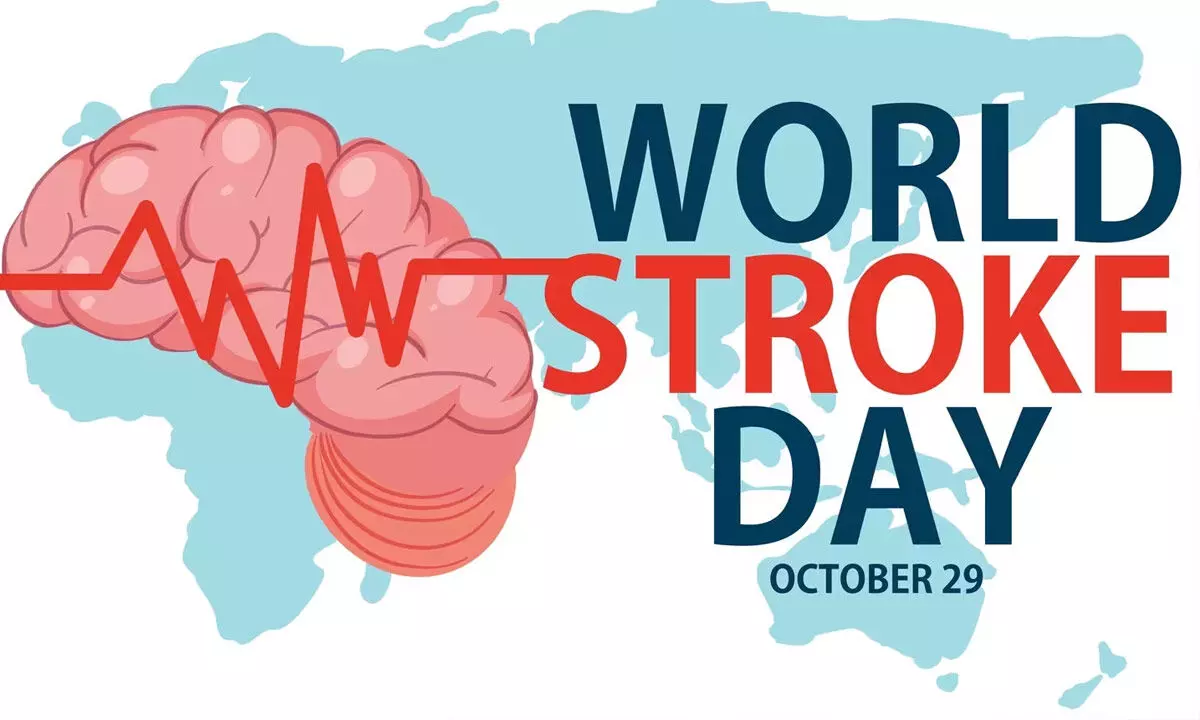Live
- SEBI takes strict action in front running case, bars 9 entities, seizes over Rs 21 crore
- India-Kuwait friendship to flourish more after elevating ties to strategic partnership: PM Modi
- PM Modi to attend Christmas celebrations hosted by Catholic Bishops' Conference of India tomorrow
- ‘Dhop’ from ‘Game Changer’ lights up musical platforms
- Allu Arjun requests fans to stop using abusive language
- Rohit Pathak: A rising star in Indian cinema with powerful villain roles
- Pooja’s ‘final day of shot for 2024’ makes waves
- Nayini Rajender Reddy Addresses Press Conference at Hanumakonda Congress Office
- ‘Game Changer’ pre-release event in Dallas is a blockbuster
- NDMC Vice Chairman hits out at AAP's registration drive; labels it 'election gimmick'
Just In
World Stroke Day: Understanding Stroke, Its Causes, and the Importance of Early Treatment


Today is World Stroke Day. Stroke is defined as a sudden onset of neurological deficit due to either partial or complete blockage of a blood vessel carrying blood to brain by a clot, called as Ischaemic stroke or due to rupture of the blood vessel resulting in leakage of blood into the brain called Haemorrhagic stroke.
Today is World Stroke Day. Stroke is defined as a sudden onset of neurological deficit due to either partial or complete blockage of a blood vessel carrying blood to brain by a clot, called as Ischaemic stroke or due to rupture of the blood vessel resulting in leakage of blood into the brain called Haemorrhagic stroke. Ischaemic stroke is more common and forms 80-85% of all stroke and rest are haemorrhagic strokes.
Stroke is the leading cause of disability and second common cause of mortality in India. Every 40 seconds there is at least a stroke occurrence and every 4 minutes there is stroke related death in India. The incidence of stroke is increasing at alarming rate every year in young people mainly due to stress and lifestyle.
Time is brain, for every minute after the onset of stroke about 1.9 million brain cells die, Each hour in which treatment fails to occur, the brain loses as many neurons as it does in almost 3.6 years of normal aging. So, if any person has symptoms suggestive of stroke, you should rush him to the hospital as early as possible to salvage the brain.
If you suffer from weakness or numbness on one half of the body, vision impairment of one or both eyes, not able to speak properly or inability to understand spoken speech, unsteadiness while walking, sudden onset of unusually severe headache for the first time in life, you should rush to the emergency because you may be eligible for clot bursting therapy/mechanical thrombectomy which can be only done in the first few hours after the onset of stroke, After the patient comes to the emergency , he or she will undergo a CT scan brain stroke protocol or in some situations MRI brain stroke protocol and some blood tests to determine if patient is eligible for clot bursting therapy. If the patient has blockage of a large blood vessel in the brain, then after initial tests he /she is taken immediately to cathlab and an endovascular procedure is done where in the clot is removed by means of a stent retriever or a suction device which can be done only in a dedicated stroke centre which has the technology and the expertise to do it. Once initial treatment is done, patients with ischaemic stroke are given antiplatelet agents like Aspirin/Clopidogrel and sometimes oral anticoagulants to prevent a next stroke, these medicine’s generally have to continued lifelong.
Some patients can have stroke symptoms but can improve completely within few hours after onset spontaneously which are called as TIA (transient ischaemic attack). Patients with TIA should be treated as a medical emergency and treatment for prevention of a major stroke should be initiated as early as possible after due investigations.
The common causes of stoke particularly Ischaemic stroke are Hypertension (High blood pressure), Diabetes Mellitus, High blood cholesterol, Cigarette smoking, heart disease excessive alcohol intake, sedentary lifestyle and excessive stress.
World stroke day is observed on October 29th each year. The theme of this year “Together we are# greater than stroke”. The theme emphasizes on the importance of risk factor control, maintaining a Healthy lifestyle by eating diet rich in fibre, protein, fruits and salads and less in simple carbohydrates and unsaturated fat, doing exercises particularly aerobic like brisk walking, jogging, cycling, swimming for at least 30-40 minutes for most days in a week. People having HTN and DM should use medicines regularly for good control, complete cessation of smoking and no alcohol or intake in moderation.
Patients who have significant residual neurological deficits will benefit from good comprehensive rehabilitation in a rehabilitation centre, Patients who have mild to moderate disability can opt for either outpatient rehabilitation or Home rehabilitation.
(The writer is a Neurologist, Apollo Hospitals, Hyderabad)

© 2024 Hyderabad Media House Limited/The Hans India. All rights reserved. Powered by hocalwire.com






